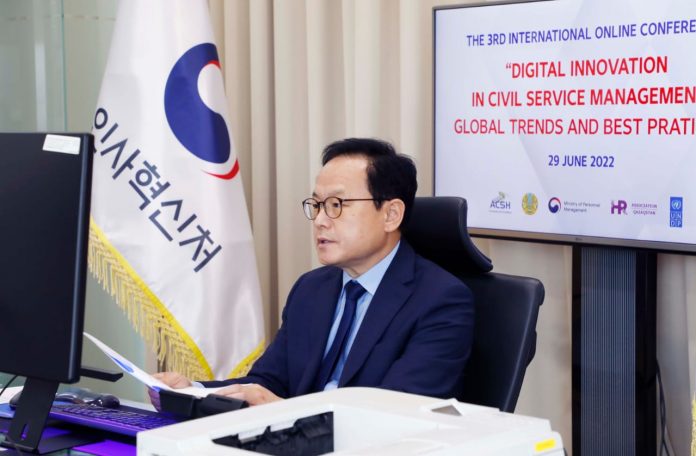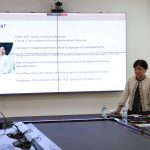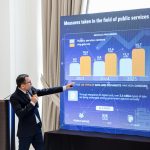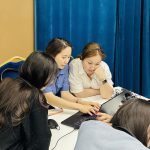Korea’s ‘e-Saram’ praised as innovative management system for public workers
By Ko Dong-hwan (“The Korea Times”)
In his first international event since the Yoon Suk-yeol administration kicked off on May 10, Korean Minister of Personnel Management Kim Seung-ho proudly touted how the country has been managing public workers via a digital platform to rely more on scientific data rather than human instinct.
The message rang loud and clear in the International Webinar on Civil Service Management, co-hosted on Wednesday by the ministry and the Astana Civil Service Hub (ACSH), an institutional platform for knowledge sharing in the field of civil service, co-launched by Kazakhstan and the UN Development Programme in 2013. The annual webinar’s theme this year was “digital innovation in civil service management.”
In the face of the global digital transformation, Kim saw that big data and AI were driving innovations in the field of civil service management. It no longer makes sense to rely only on past practices or the decisions of high officials in the fields of recruitment, deployment, human resource development and performance management.
Furthermore, the COVID-19 pandemic opened his eyes to the reality that Korea has become an ultra-connected and contactless society faster than he had expected. Many advanced countries like Australia and Canada, as well as global organizations like the OECD, shared his understanding, highlighting the significance of data-based civil service management. There seemed to be no better time than the present to host the webinar under that particular theme.
“The Yoon administration announced as one of its key policy tasks that it will build the world’s best digital platform government connecting all data,” Kim said during a recent interview with The Korea Times. “The initiative is aimed at engaging people, businesses and the government together to address societal challenges and generate new values based on a digital platform that connects all such data.”
The innovative challenge, in fact, has already been undertaken in the country in the field of civil service management. It has yielded meaningful results, including: e-Saram, the Talent Development Platform, the Government E-learning Platform and the Intelligent Talent Recommendation Database, all of which have been built with the ministry’s AI- and big data-based technologies.
Kim mentioned e-Saram in particular as the ministry’s leading accomplishment in the digital innovation of government administration. The backbone of the Korean e-government system, it now awaits its third-generation version to unfold in 2025 after its introduction in 2000. Once the next-generation HR management system is completed, it will offer customized services to every user “with the help of robotics and automation technologies,” Kim said.
“E-Saram is a standardized administrative support system that enables the integrated, electronic HR management of the country’s civil servants from their recruitment to retirement. It also utilizes the collected data for designing future HR policies,” the minister said.
Kim mentioned another key agenda item of the Yoon administration’s foreign policy framework ― building regional partnership networks for co-prosperity ― as a step the ministry will also take. It was one of the reasons he hosted Wednesday’s webinar, joined by seven personnel administration organizations from six countries in Central Asia and Europe, including Kazakhstan, Uzbekistan, Kyrgyzstan and Belgium.
Even before the webinar, the ministry, since its establishment in 2014, has organized meetings with international organizations for purposes of multilateral cooperation, like the ACSH, the OECD, the ASEAN Countries Plus 3 Cooperation on Civil Service Matters (ACCSM+3), the Inter-American Development Bank (IDB), the Central American Bank for Economic Integration (CABEI) and the Korea-China-Japan Network.
Kim said the ministry will further reinforce bilateral ties, signing MOUs to build medium- to long-term partnerships, undertake official development assistance (ODA) projects to assist partner states to enhance their civil service management capacity and host webinars to introduce Korea’s HR management system. The ministry will also publish handbooks on Korean civil service management in different languages to respond to increased interest in the country’s HR management system. The authority began publishing them in Korean in 2020.
Kim is especially interested in Central Asian nations. Acknowledging the ACSH as a focal point of the ministry’s international collaboration in the region, the minister said he wishes to resume high-level exchanges with the states in the region now that pandemic-related travel restrictions have been somewhat eased.
For starters, the ministry plans to proactively implement development cooperation projects with partner countries in the region that aspire to strengthen their civil service management capacities. The minister is also looking to host international webinars, like the one on Wednesday, on a regular basis, as well as conduct joint case studies with partner countries.
“There is a certain government development program run by the country’s Ministry of Economy and Finance, called the Knowledge Sharing Program, where a wide range of projects are planned and undertaken by Korea and its partner countries,” said Kim. “It is funded by the Korean central government. We also plan to gradually restart discussions at appropriate times on convening MOU signing ceremonies with the ACSH, Kyrgyzstan and Uzbekistan.”
https://www.koreatimes.co.kr/www/tech/2022/07/129_331858.html







